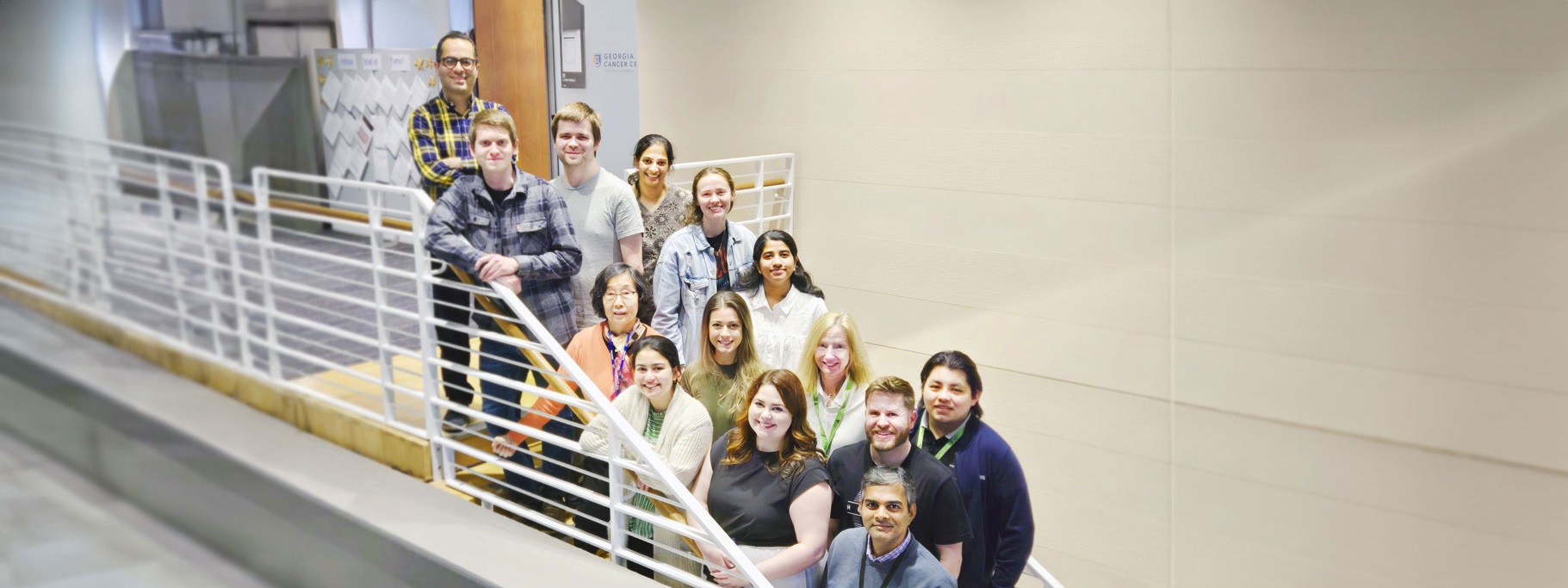
We are an internationally diverse group of scientists who share a common passion: scientific discovery. Here at AU, we blend our expertise and creativity to discover new ways to harness the power of the immune system to treat disease. If you are interested in joining our team, please email us!

Catherine 'Lynn' Hedrick, PhD
Georgia Research Alliance Bradley Turner Eminent Scholar in Vascular and Cancer Immunology
Co-Director, Immunology Center of Georgia
Professor, Department of Medicine
Medical College of Georgia at Augusta University
Jump to: What We Study Research Team Current Research Interests Publications
Immune cells are central to our health and are key cellular players in fighting disease. Innate immune myeloid cells, (including monocytes, dendritic cells, neutrophils, and macrophages) are early responder immune cells that sense pathogenic bacteria, viruses, and even tumor cells, and then orchestrate their killing. Our laboratory studies these myeloid cells in health, cardiovascular disease, and cancers. Key new projects are to determine how these innate immune cells differ in healthy men and women and in healthy people from different ethnicities, and how these differences impact disease susceptibility.
We utilize high dimensional immunoprofiling methods, including CyTOF mass cytometry and single cell RNA sequencing to study myeloid cells in healthy humans, and in human subjects with heart disease and cancer. We use our discoveries to create new molecular targets of disease and to predict responses to immunotherapy.
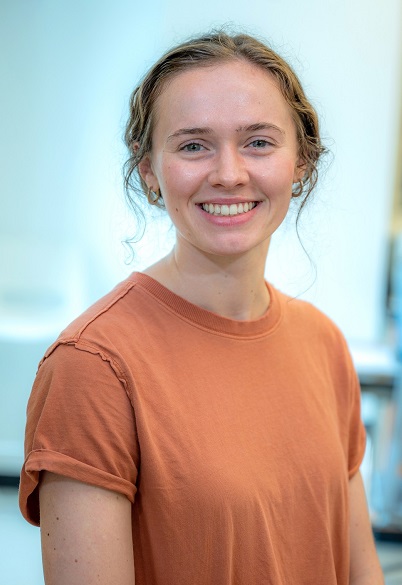
Layne Benson, BS

United States of America
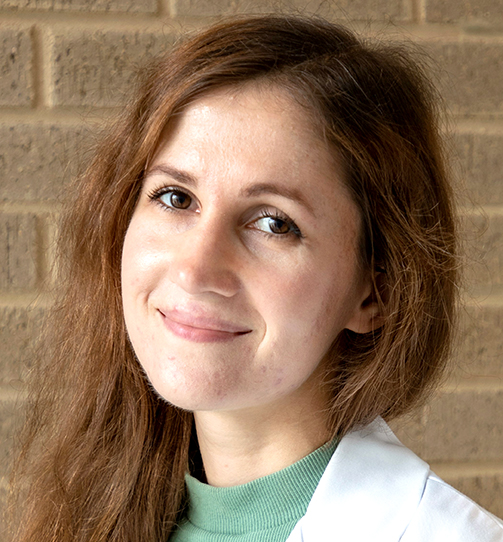
Irina Baranovskaya, PhD

Belarus
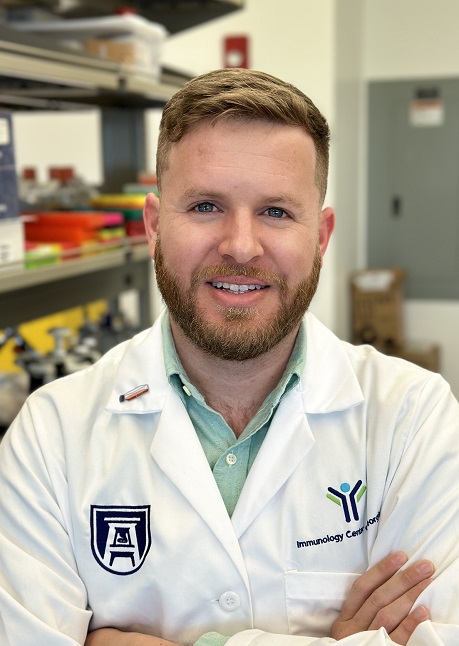
Gabriel Valentin-Guillama, PhD

Puerto Rico
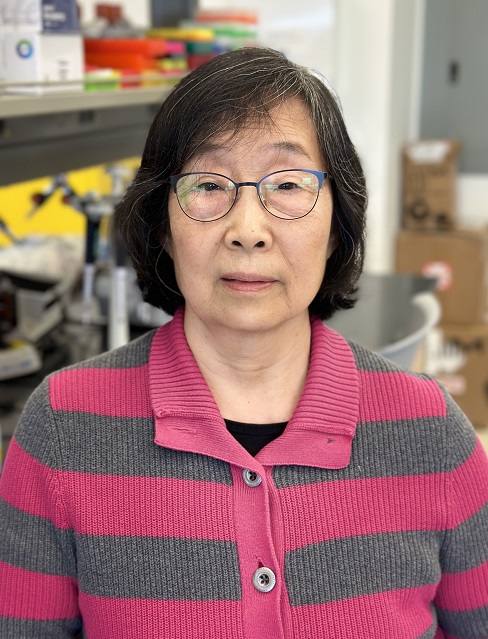
Yali Zhu, PhD

United States of America
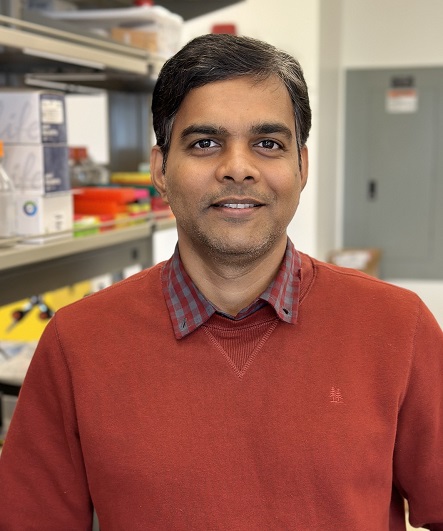
Ravi Komaravolu, PhD

India
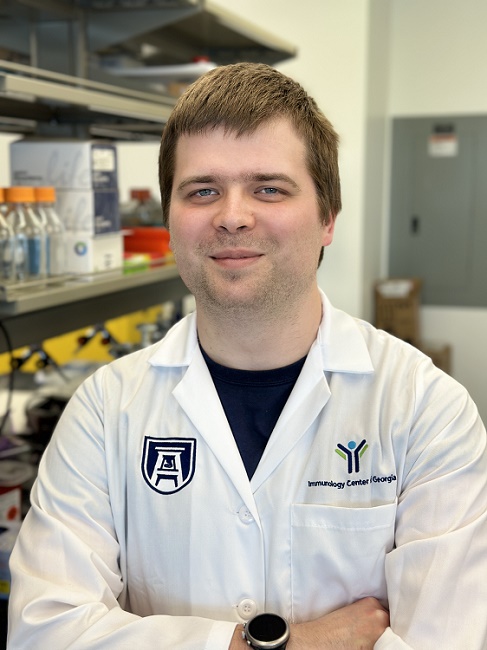
Mikhail Fomin, MS

United States of America

Natalia Jaeger, PhD

Brazil

Sabrina Robichaud, PhD
 Canada
Canada

Aleksandr (Sasha) Taraskin, PhD

Russia
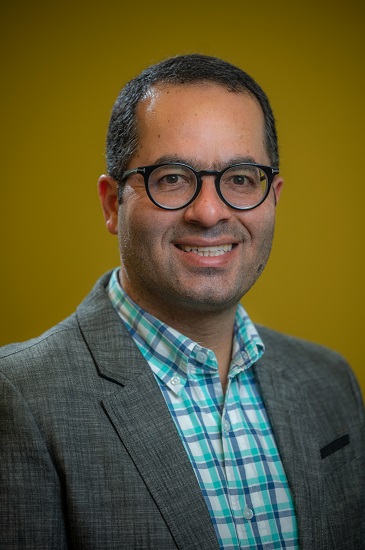
Ahmad Alimadadi, PhD

Iran
How does lipid metabolism in macrophages impact the tumor microenvironment to regulate tumor growth?
Here, we study specialized mouse models of lipid metabolism and blood from human cancer patients to understand how lipid pathway changes in myeloid cells alter tumor growth. Methods include working with human clinical sample analysis, tumor mouse models, immunoprofiling, high parameter flow cytometry, CyTOF, bioinformatics, and metabolic studies.
How do monocytes recognize tumor cells that are undergoing metastasis?
Select subsets of monocytes are critical in orchestrating the killing of tumor cells as they are traveling through the vasculature to new seeding sites. Here we seek to understand how these cells selectively identify the metastatic tumor cell. Methods include working with tumor mouse models, immunoprofiling, high parameter flow cytometry, RNa sequencing, intravital live cell imaging.
How do monocytes and macrophage cell subsets influence cardiovascular events that occur in cancer patients?
Some cancer patients receiving therapy develop cardiovascular complications, the understanding of which is the emerging field of cardio-oncology. Here, we will study monocyte subsets and functions in cancer patients who develop cardiovascular complications. Methods include working with human blood samples, immunoprofiling, high parameter flow cytometry, functional assays, and bioinformatics approaches.
How are monocytes changed in atherosclerosis progression? Are there specific functional markers that can be utilized to prevent disease progression? How do they influence T and B cell adaptive responses?
Monocytes play several key roles in atherosclerosis, but we still don’t mechanistically understand how we can better enhance them or target them to control atherosclerosis progression. Here, we study monocytes in human subjects with low to high cardiovascular disease severity to answer these questions using flow cytometry, single cell RNA sequencing, bioinformatics approaches, genetic mouse models of monocyte subsets, and functional assays.
Are there sex and ethnic differences present in monocyte subsets that change how they function in atherosclerosis?
Females develop less atherosclerosis until menopause. Ethnic differences in atherosclerosis progression have been reported. Here, we study how sex and ethnicity impacts monocyte function in cardiovascular disease. High dimensional immunoprofiling, epidemiology, bioinformatics and functional assays will be utilized to answer these questions.
| Publication |
|---|
Transcriptional programs underlying human monocyte differentiation and diversityKomaravolu, R. K., Araujo, D. J., Hedrick, C. C. & Alimadadi, A., Jul 1 2025, In: Journal of Leukocyte Biology. 117, 7, qiaf058.Research output: Contribution to journal › Article › peer-review |
From killers to hoplites: neutrophils in skin barrier defenseLowery, A., Zhu, Y. & Hedrick, C. C., Jun 1 2025, In: Journal of Leukocyte Biology. 117, 6, qiaf074.Research output: Contribution to journal › Review article › peer-review |
Sex differences in adenosine deaminase activity associate with disparities in SARS-CoV-2 innate immunitySaminathan, P., Mathews, I. T., Alimadadi, A., Fung, K., Kakugawa, K., Joosten, L. A. B., Netea, M. G., Jain, M., Cheng, S., Hedrick, C. C. & Sharma, S., May 16 2025, In: iScience. 28, 5, 112418.Research output: Contribution to journal › Article › peer-review |
Blocking Feedback Immunosuppression of Antigen Presentation in Brain Tumor During Oncolytic Virotherapy with oHSV-mshPKRTsuboi, N., Rivera-Caraballo, K. A., Sahu, U., Pacholczyk, R., Douglass, E., Johnson, T. S., Wang, Q., Kolhe, R., Hedrick, C. C., Munn, D. H. & Hong, B., Mar 1 2025, In: Molecular cancer therapeutics. 24, 3, p. 444-452 9 p.Research output: Contribution to journal › Article › peer-review |
Defining myeloid-derived suppressor cellsAkkari, L., Amit, I., Bronte, V., Fridlender, Z. G., Gabrilovich, D. I., Ginhoux, F., Hedrick, C. C. & Ostrand-Rosenberg, S., Dec 2024, In: Nature Reviews Immunology. 24, 12, p. 850-857 8 p.Research output: Contribution to journal › Article › peer-review |
Reducing racial and ethnic disparities in cardiovascular outcomes among cancer survivorsTan, M. C., Stabellini, N., Tan, J. Y., Thong, J. Y., Hedrick, C., Moore, J. X., Cullen, J., Hines, A., Sutton, A., Sheppard, V., Agarwal, N. & Guha, A., Oct 2024, In: Current Oncology Reports. 26, 10, p. 1205-1212 8 p.Research output: Contribution to journal › Review article › peer-review |
Olfr2-positive macrophages originate from monocytes proliferate in situ and present a pro-inflammatory foamy-like phenotypeSuthahar, S. S. A., Nettersheim, F. S., Alimadadi, A., Wang, E., Billitti, M., Resto-Trujillo, N., Roy, P., Hedrick, C., Ley, K. & Orecchioni, M., Sep 1 2024, In: Cardiovascular Research. 120, 13, p. 1577-1589 13 p.Research output: Contribution to journal › Article › peer-review |
Single-Cell Sleuthing: Cracking the Monocyte Code for Cardiovascular CluesHedrick, C. C., Aug 30 2024, In: Circulation research. 135, 6, p. 701-703 3 p.Research output: Contribution to journal › Editorial › peer-review |
Defective endomembrane dynamics in Rab27a deficiency impairs nucleic acid sensing and cytokine secretion in immune cellsYu, J., Meneses-Salas, E., Johnson, J. L., Manenti, S., Kbaich, M. A., Chen, D., Askari, K., He, J., Shukla, A., Shaji, B., Gonzalez-Quintial, R., Croker, B. A., Zhang, J., Hoffman, H., Kiosses, W. B., Hedrick, C., Pestonjamasp, K., Wineinger, N., Baccala, R. & Catz, S. D., Aug 27 2024, In: Cell Reports. 43, 8, 114598.Research output: Contribution to journal › Article › peer-review |
Cardiovascular Diseases Increase Cancer Mortality in Adults: NHANES-Continuous StudyMakram, O. M., Okwuosa, T., Addison, D., Cortes, J., Dent, S., Bevel, M., Ganatra, S., Al-Kindi, S., Hedrick, C. C., Weintraub, N. L., Wang, X. & Guha, A., Aug 6 2024, In: Journal of the American Heart Association. 13, 15, e035500.Research output: Contribution to journal › Article › peer-review |
Examining the interplay between cardiovascular disease and cancer incidence: Data from NHANES III and continuousMakram, O. M., Kunhiraman, H. H., Harris, R. A., Hedrick, C. C., Nasir, K., Weintraub, N. L., Wang, X. & Guha, A., Apr 2024, In: American Heart Journal Plus: Cardiology Research and Practice. 40, 100380.Research output: Contribution to journal › Article › peer-review |
Single Cell High Dimensional Analysis of Human Peripheral Blood Mononuclear Cells Reveals Unique Intermediate Monocyte Subsets Associated with Sex Differences in Coronary Artery DiseaseChatterjee, N., Komaravolu, R. K., Durant, C. P., Wu, R., McSkimming, C., Drago, F., Kumar, S., Valentin-Guillama, G., Miller, Y. I., McNamara, C. A., Ley, K., Taylor, A., Alimadadi, A. & Hedrick, C. C., Mar 2024, In: International journal of molecular sciences. 25, 5, 2894.Research output: Contribution to journal › Article › peer-review |
Immune determinants of CAR-T cell expansion in solid tumor patients receiving GD2 CAR-T cell therapyKaczanowska, S., Murty, T., Alimadadi, A., Contreras, C. F., Duault, C., Subrahmanyam, P. B., Reynolds, W., Gutierrez, N. A., Baskar, R., Wu, C. J., Michor, F., Altreuter, J., Liu, Y., Jhaveri, A., Duong, V., Anbunathan, H., Ong, C., Zhang, H., Moravec, R. & Yu, J. & 24 others, Biswas, R., Van Nostrand, S., Lindsay, J., Pichavant, M., Sotillo, E., Bernstein, D., Carbonell, A., Derdak, J., Klicka-Skeels, J., Segal, J. E., Dombi, E., Harmon, S. A., Turkbey, B., Sahaf, B., Bendall, S., Maecker, H., Highfill, S. L., Stroncek, D., Glod, J., Merchant, M., Hedrick, C. C., Mackall, C. L., Ramakrishna, S. & Kaplan, R. N., Jan 8 2024, In: Cancer Cell. 42, 1, p. 35-51.e8Research output: Contribution to journal › Article › peer-review |
Author Correction: Human circulating CD24hi marginal zone B cells produce IgM targeting atherogenic antigens and confer protection from vascular disease (Nature Cardiovascular Research, (2023), 2, 11, (1003-1014), 10.1038/s44161-023-00356-1)Pattarabanjird, T., Nguyen, A. T., McSkimming, C., Dinh, H. Q., Marshall, M. A., Ghosheh, Y., Gulati, R., Durant, C., Vallejo, J., Saigusa, R., Drago, F., Guy, T. V., Premo, K., Taylor, A. M., Paul, S., Kundu, B., Berr, S., Gonen, A., Tsimikas, S. & Miller, Y. & 4 others, Pillai, S., Ley, K., Hedrick, C. C. & McNamara, C. A., Dec 2023, In: Nature Cardiovascular Research. 2, 12, p. 1328 1 p.Research output: Contribution to journal › Comment/debate › peer-review |
Human circulating CD24hi marginal zone B cells produce IgM targeting atherogenic antigens and confer protection from vascular diseasePattarabanjird, T., Nguyen, A. T., McSkimming, C., Dinh, H. Q., Marshall, M. A., Ghosheh, Y., Gulati, R., Durant, C., Vallejo, J., Saigusa, R., Drago, F., Guy, T. V., Premo, K., Taylor, A. M., Paul, S., Kundu, B., Berr, S., Gonen, A., Tsimikas, S. & Miller, Y. & 4 others, Pillai, S., Ley, K., Hedrick, C. C. & McNamara, C. A., Nov 2023, In: Nature Cardiovascular Research. 2, 11, p. 1003-1014 12 p.Research output: Contribution to journal › Article › peer-review |
Single-cell profiling reveals distinct subsets of CD14+ monocytes drive blood immune signatures of active tuberculosisHillman, H., Khan, N., Singhania, A., Dubelko, P., Soldevila, F., Tippalagama, R., DeSilva, A. D., Gunasena, B., Perera, J., Scriba, T. J., Ontong, C., Fisher, M., Luabeya, A., Taplitz, R., Seumois, G., Vijayanand, P., Hedrick, C. C., Peters, B. & Burel, J. G., Jan 11 2023, In: Frontiers in immunology. 13, 1087010.Research output: Contribution to journal › Article › peer-review |
Single cell transcriptomics reveals recent CD8T cell receptor signaling in patients with coronary artery diseaseIqneibi, S., Saigusa, R., Khan, A., Oliaeimotlagh, M., Armstrong Suthahar, S. S., Kumar, S., Alimadadi, A., Durant, C. P., Ghosheh, Y., McNamara, C. A., Hedrick, C. C. & Ley, K., 2023, In: Frontiers in immunology. 14, 1239148.Research output: Contribution to journal › Article › peer-review |
Nonclassical monocytes potentiate anti-tumoral CD8+ T cell responses in the lungsPadgett, L. E., Marcovecchio, P. M., Olingy, C. E., Araujo, D. J., Steel, K., Dinh, H. Q., Alimadadi, A., Zhu, Y. P., Meyer, M. A., Kiosses, W. B., Thomas, G. D. & Hedrick, C. C., 2023, In: Frontiers in immunology. 14, 1101497.Research output: Contribution to journal › Article › peer-review |
Human CD79b+ neutrophils in the blood are associated with early-stage melanomaMeyer, M. A., Dinh, H. Q., Alimadadi, A., Araujo, D. J., Chatterjee, N., Gutierrez, N. A., Zhu, Y. P., Hunter, E. L., Liang, S., Seumois, G., Kiosses, W. B., Catz, S. D., Vijayanand, P., Ottensmeier, C. & Hedrick, C. C., 2023, In: Frontiers in immunology. 14, 1224045.Research output: Contribution to journal › Article › peer-review |
Single-cell immune profiling reveals long-term changes in myeloid cells and identifies a novel subset of CD9+ monocytes associated with COVID-19 hospitalizationPandori, W. J., Padgett, L. E., Alimadadi, A., Gutierrez, N. A., Araujo, D. J., Huh, C. J., Olingy, C. E., Dinh, H. Q., Wu, R., Vijayanand, P., Chee, S. J., Ottensmeier, C. H. & Hedrick, C. C., Nov 2022, In: Journal of Leukocyte Biology. 112, 5, p. 1053-1063 11 p.Research output: Contribution to journal › Article › peer-review |
Single cell transcriptomics and TCR reconstruction reveal CD4 T cell response to MHC-II-restricted APOB epitope in human cardiovascular diseaseSaigusa, R., Roy, P., Freuchet, A., Gulati, R., Ghosheh, Y., Armstrong Suthahar, S. S., Durant, C. P., Hanna, D. B., Kiosses, W. B., Orecchioni, M., Wen, L., Wu, R., Kuniholm, M. H., Landay, A. L., Anastos, K., Tien, P. C., Gange, S. J., Kassaye, S., Vallejo, J. & Hedrick, C. C. & 5 others, Kwok, W. W., Sette, A., Hodis, H. N., Kaplan, R. C. & Ley, K., May 2022, In: Nature Cardiovascular Research. 1, 5, p. 462-475 14 p.Research output: Contribution to journal › Article › peer-review |
Bone Marrow Transplantation Rescues Monocyte Recruitment Defect and Improves Cystic Fibrosis in MiceFan, Z., Pitmon, E., Wen, L., Miller, J., Ehinger, E., Herro, R., Liu, W., Chen, J., Mikulski, Z., Conrad, D. J., Marki, A., Orecchioni, M., Kumari, P., Zhu, Y. P., Marcovecchio, P. M., Hedrick, C. C., Hodges, C. A., Rathinam, V. A., Wang, K. & Ley, K., Feb 1 2022, In: Journal of Immunology. 208, 3, p. 745-752 8 p.Research output: Contribution to journal › Article › peer-review |
The atypical small GTPase GEM/Kir is a negative regulator of the NADPH oxidase and NETs production through macroautophagyJohnson, J. L., Ramadass, M., Rahman, F., Meneses-Salas, E., Zgajnar, N. R., Carvalho Gontijo, R., Zhang, J., Kiosses, W. B., Zhu, Y. P., Hedrick, C. C., Perego, M., Gunton, J. E., Pestonjamasp, K., Napolitano, G. & Catz, S. D., Oct 2021, In: Journal of Leukocyte Biology. 110, 4, p. 629-649 21 p.Research output: Contribution to journal › Article › peer-review |
Pathogenic Autoimmunity in Atherosclerosis Evolves From Initially Protective Apolipoprotein B100-Reactive CD4+T-Regulatory CellsWolf, D., Gerhardt, T., Winkels, H., Michel, N. A., Pramod, A. B., Ghosheh, Y., Brunel, S., Buscher, K., Miller, J., McArdle, S., Baas, L., Kobiyama, K., Vassallo, M., Ehinger, E., Dileepan, T., Ali, A., Schell, M., Mikulski, Z., Sidler, D. & Kimura, T. & 13 others, Sheng, X., Horstmann, H., Hansen, S., Mitre, L. S., Stachon, P., Hilgendorf, I., Gaddis, D. E., Hedrick, C., Benedict, C. A., Peters, B., Zirlik, A., Sette, A. & Ley, K., Sep 29 2020, In: Circulation. 142, 13, p. 1279-1293 15 p.Research output: Contribution to journal › Article › peer-review |
Cellular sensing of extracellular purine nucleosides triggers an innate IFN-β responseDhanwani, R., Takahashi, M., Mathews, I. T., Lenzi, C., Romanov, A., Watrous, J. D., Pieters, B., Hedrick, C. C., Benedict, C. A., Linden, J., Nilsson, R., Jain, M. & Sharma, S., Jul 2020, In: Science Advances. 6, 30, aba3688.Research output: Contribution to journal › Article › peer-review |
Macrophage Syk–PI3Kg inhibits antitumor immunity: SRX3207, a novel dual Syk–PI3K inhibitory chemotype relieves tumor immunosuppressionJoshi, S., Liu, K. X., Zulcic, M., Singh, A. R., Skola, D., Glass, C. K., Dominick Sanders, P., Sharabi, A. B., Pham, T. V., Tamayo, P., Shiang, D., Dinh, H. Q., Hedrick, C. C., Morales, G. A., Garlich, J. R. & Durden, D. L., Mar 2020, In: Molecular cancer therapeutics. 19, 3, p. 755-764 10 p.Research output: Contribution to journal › Article › peer-review |
Patrolling monocytes control NK cell expression of activating and stimulatory receptors to curtail lung metastasesNarasimhan, P. B., Eggert, T., Zhu, Y. P., Marcovecchio, P., Meyer, M. A., Wu, R. & Hedrick, C. C., 2020, In: Journal of Immunology. 204, 1, p. 192-198 7 p.Research output: Contribution to journal › Article › peer-review |
Erratum to: Oxidized phospholipids are proinflammatory and proatherogenic in hypercholesterolaemic mice (Nature, (2018), 558, 7709, (301-306), 10.1038/s41586-018-0198-8)Que, X., Hung, M. Y., Yeang, C., Gonen, A., Prohaska, T. A., Sun, X., Diehl, C., Määttä, A., Gaddis, D. E., Bowden, K., Pattison, J., MacDonald, J. G., Ylä-Herttuala, S., Mellon, P. L., Hedrick, C. C., Ley, K., Miller, Y. I., Glass, C. K., Peterson, K. L. & Binder, C. J. & 2 others, Tsimikas, S. & Witztum, J. L., Sep 27 2018, In: Nature. 561, 7724, p. E43Research output: Contribution to journal › Comment/debate › peer-review |
Understanding the tumor immune microenvironment (TIME) for effective therapyBinnewies, M., Roberts, E. W., Kersten, K., Chan, V., Fearon, D. F., Merad, M., Coussens, L. M., Gabrilovich, D. I., Ostrand-Rosenberg, S., Hedrick, C. C., Vonderheide, R. H., Pittet, M. J., Jain, R. K., Zou, W., Howcroft, T. K., Woodhouse, E. C., Weinberg, R. A. & Krummel, M. F., May 1 2018, In: Nature Medicine. 24, 5, p. 541-550 10 p.Research output: Contribution to journal › Article › peer-review |
Scavenger receptor CD36 directs nonclassical monocyte patrolling along the endothelium during early atherogenesisMarcovecchio, P. M., Thomas, G. D., Mikulski, Z., Ehinger, E., Mueller, K. A. L., Blatchley, A., Wu, R., Miller, Y. I., Nguyen, A. T., Taylor, A. M., McNamara, C. A., Ley, K. & Hedrick, C. C., 2017, In: Arteriosclerosis, thrombosis, and vascular biology. 37, 11, p. 2043-2052 10 p.Research output: Contribution to journal › Article › peer-review |
Deleting an Nr4a1 Super-Enhancer Subdomain Ablates Ly6Clow Monocytes while Preserving Macrophage Gene FunctionThomas, G. D., Hanna, R. N., Vasudevan, N. T., Hamers, A. A., Romanoski, C. E., McArdle, S., Ross, K. D., Blatchley, A., Yoakum, D., Hamilton, B. A., Mikulski, Z., Jain, M. K., Glass, C. K. & Hedrick, C. C., Nov 15 2016, In: Immunity. 45, 5, p. 975-987 13 p.Research output: Contribution to journal › Article › peer-review |
2014 Jeffrey M. Hoeg award lecture: Transcriptional control of monocyte developmentZhu, Y. P., Thomas, G. D. & Hedrick, C. C., Sep 1 2016, In: Arteriosclerosis, thrombosis, and vascular biology. 36, 9, p. 1722-1733 12 p.Research output: Contribution to journal › Review article › peer-review |
Patrolling monocytes control tumor metastasis to the lungHanna, R. N., Cekic, C., Sag, D., Tacke, R., Thomas, G. D., Nowyhed, H., Herrley, E., Rasquinha, N., McArdle, S., Wu, R., Peluso, E., Metzger, D., Ichinose, H., Shaked, I., Chodaczek, G., Biswas, S. K. & Hedrick, C. C., Nov 20 2015, In: Science. 350, 6263, p. 985-990 6 p.Research output: Contribution to journal › Article › peer-review |
IL-10-producing NKT10 cells are a distinct regulatory invariant NKT cell subsetSag, D., Krause, P., Hedrick, C. C., Kronenberg, M. & Wingender, G., Sep 2 2014, In: Journal of Clinical Investigation. 124, 9, p. 3725-3740 16 p.Research output: Contribution to journal › Article › peer-review |
Stressing out stem cells: Linking stress and hematopoiesis in cardiovascular diseaseHanna, R. N. & Hedrick, C. C., Jul 2014, In: Nature Medicine. 20, 7, p. 707-708 2 p.Research output: Contribution to journal › Review article › peer-review |
Molecular imaging of the paracrine proangiogenic effects of progenitor cell therapy in limb ischemiaRyu, J. C., Davidson, B. P., Xie, A., Qi, Y., Zha, D., Belcik, J. T., Caplan, E. S., Woda, J. M., Hedrick, C. C., Hanna, R. N., Lehman, N., Zhao, Y., Ting, A. & Lindner, J. R., Feb 12 2013, In: Circulation. 127, 6, p. 710-719 10 p.Research output: Contribution to journal › Article › peer-review |
Accelerated atherosclerosis in apoe -/- mice heterozygous for the insulin receptor and the insulin receptor substrate-1Galkina, E. V., Butcher, M., Keller, S. R., Goff, M., Bruce, A., Pei, H., Sarembock, I. J., Sanders, J. M., Nagelin, M. H., Srinivasan, S., Kulkarni, R. N., Hedrick, C. C., Lattanzio, F. A., Dobrian, A. D., Nadler, J. L. & Ley, K., Feb 2012, In: Arteriosclerosis, thrombosis, and vascular biology. 32, 2, p. 247-256 10 p.Research output: Contribution to journal › Article › peer-review |
An intracellular role for ABCG1-mediated cholesterol transport in the regulated secretory pathway of mouse pancreatic β cellsSturek, J. M., Castle, J. D., Trace, A. P., Page, L. C., Castle, A. M., Evans-Molina, C., Parks, J. S., Mirmira, R. G. & Hedrick, C. C., Jul 1 2010, In: Journal of Clinical Investigation. 120, 7, p. 2575-2589 15 p.Research output: Contribution to journal › Article › peer-review |
ATP-Binding Cassette Transporter G1 Negatively Regulates Thymocyte and Peripheral Lymphocyte ProliferationArmstrong, A. J., Gebre, A. K., Parks, J. S. & Hedrick, C. C., Jan 1 2010, In: Journal of Immunology. 184, 1, p. 173-183 11 p.Research output: Contribution to journal › Article › peer-review |
A critical role for ABCG1 in macrophage inflammation and lung homeostasisWojcik, A. J., Skaflen, M. D., Srinivasan, S. & Hedrick, C. C., Mar 15 2008, In: Journal of Immunology. 180, 6, p. 4273-4282 10 p.Research output: Contribution to journal › Article › peer-review |
